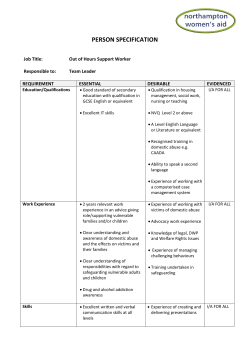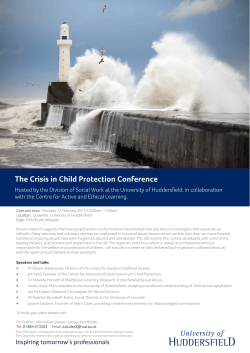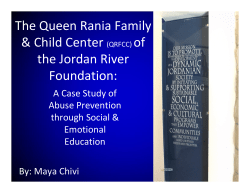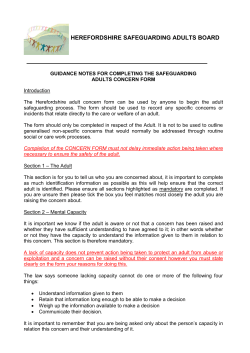
Adult safeguarding leaflet 2015
Everyone is responsible for preventing abuse by raising any concerns they have – it really is ‘Everyone’s Business’. Abuse and neglect could be prevented if concerns are identified and raised as early as possible. It is important that everyone knows what to look for, and who they can go to for advice and support. Changes in someone’s physical or emotional state, or injuries that cannot be explained, may be a sign of abuse. The Sussex Safeguarding Adults Boards have arrangements in place to prevent and protect people who may be at risk of, or who are experiencing, abuse or neglect. This is set out in the ‘Sussex Safeguarding Adults Policy and Procedures’. Who may be at risk of abuse or neglect? People who are 18 years or over, who have care and support needs because of their age, physical or learning disability, mental-health needs, or other illness are, or may be, unable to protect themselves from abuse or neglect because of their care and support needs. Other adults who may be at risk include people who are: • unpaid carers; • homeless; • experiencing domestic violence; • addicted to drugs or alcohol; • badly treated and forced to work for little or no pay; or • forced to marry. Abuse can happen anywhere! For example: • at home; • in a care home, hospital or day service; • at work or at school or college; or • in a public place or in the community. Abuse can be caused by anyone! For example: • a partner, carer, relative, child, neighbour or friend; • a health, social-care or other worker, whether they are paid or a volunteer; • a stranger; or • another person with care and support needs. Abuse can be deliberate or unintentional. Some people may not be able to tell anyone that they are being abused or neglected. Sometimes it happens if a carer is having difficulty coping. www.pansussexadultssafeguarding.proceduresonline.com/index.htm Physical abuse “Abuse can take many forms” If you are concerned that you or someone you know may be being abused, neglected or exploited, please say something. This includes being pushed, shaken, pinched, hit, held down, locked in a room, restrained inappropriately, or knowingly giving a person too much or not enough medication. Sexual abuse This involves a person being made to take part in sexual activity when they do not, or cannot, agree to this. It includes rape, indecent exposure, inappropriate looking or touching, or sexual activity where the other person is in a position of power or authority. Financial abuse This includes misusing or stealing a person’s money or belongings, fraud, postal or internet scams tricking people out of money, or pressuring a person into making decisions about their financial affairs, including decisions involving wills and property. Neglect This involves not meeting a person’s physical, medical or emotional needs, either deliberately, or by failing to understand these. It includes ignoring a person’s needs, or not providing the person with essential things to meet their needs, such as medication, food, water, shelter and warmth. Self-neglect This involves a person being unable, or unwilling, to care for their own essential needs, including their health or surroundings (for example, their home may be infested by rats or very unclean, or there may be a fire risk due to their obsessive hoarding). Psychological or emotional abuse This includes being shouted at, ridiculed or bullied, threatened, humiliated, blamed or controlled by intimidation or fear. It includes harassment, verbal abuse, online or mobile phone bullying and isolation. Discriminatory abuse This includes forms of harassment, ill-treatment, threats or insults because of a person’s race, age, culture, gender, gender identity, religion, sexuality, physical or learning disability, or mental-health needs. Discriminatory abuse can also be called ‘hate crime’. Modern slavery This includes slavery, a person being forced to work for little or no pay (including in the sex trade), being held against their will, tortured, abused or treated badly by others. Domestic violence This includes psychological, physical, sexual, financial or emotional abuse by someone who is a family member or is, or has been, in a close relationship with the person being abused. This may be a one-off incident or a pattern of incidents or threats, violence or controlling behaviour. It also includes being forced to marry or undergo genital mutilation. Organisational abuse This includes neglect and providing poor care in a care setting such as a hospital or care home, or in a person’s own home. This may be a one-off incident, repeated incidents or on-going ill-treatment. It could be due to neglect or poor care because of the arrangements, processes and practices in an organisation. No-one should have to live with abuse or neglect. It is always wrong, whatever the circumstances. Don’t assume that someone else is doing something about the situation. You can use the information in this leaflet to get advice or raise a concern. • If you, or the person you are concerned about, are injured, call an ambulance or a doctor. • If you think a crime has been committed, contact the police. • Contact Adults’ Services or one of the independent agencies for advice (see ‘Other useful contacts’, on the next page). You can do this without giving your name. • Make a note of your concerns, what has happened and anything you have done about it. • If you are concerned about someone you know, try to speak to them, if it is safe to do this. Tell them why you are concerned and ask them what they want you to do about it. Always try to get them to agree to getting help. What will happen next? If you report a concern to us, we will: • talk to the person at risk to find out what they want to happen; • support the person to have an advocate (someone to represent them) if they need one; • respond professionally and sensitively and take your concerns seriously; • talk to the police if a crime may have been committed; • talk to other agencies that need to be involved; and • agree the best way of helping, including other types of support. If following the safeguarding adults procedures is the best way to provide help, we will: • work with the person to help keep them safe; • make a plan to look into the concerns; and • check with the person that what they wanted to happen has happened. If the person refuses help, but others may be at risk, we will need to take appropriate action. However, we will always keep them informed about any action we decide to take. You can also get information from: • West Sussex Safeguarding Adults Board Website: www.westsussex.gov.uk and search ‘Safeguarding Adults Board’. We can provide this information in large print, in Braille, in audio format or in community languages. Please phone 01243 642121. West Sussex Safeguarding Adults Board is a partnership of agencies and organisations including West Sussex County Council, health services, police and other organisations. Other useful contacts • Elder Abuse Response 080 8808 8141 Website: www.elderabuse.org.uk • West Sussex Mental Health (outside of office hours) Helpline 0300 5000 101 • Healthwatch 0300 012 0122 • Public Concern at Work (for staff concerned about bad practice in the workplace) 020 7404 6609 • NHS 111 Service (24 hour). Phone: 111 • Samaritans 08457 909090 • Carers Direct National Helpline 0300 123 1053 • Care Quality Commission 03000 616161 • National Domestic Violence (24-hour) Helpline Freephone 0808 2000 247 How to report suspected abuse of an adult at risk Phone West Sussex Adults’ Services Care Point on 01243 642121. Fill in a safeguarding concern form online at www.westsussex.gov.uk/ reportadultabuse Use Typetalk on 018001 01243 642121. Write to: Adults’ CarePoint, Second floor, The Grange, County Hall, Chichester, PO19 1RG. To order more of these leaflets, please phone Adults’ Carepoint on 01243 642121. WS100 March 2015 What can you do? What to do if you or someone you know may be being neglected or abused
© Copyright 2025











